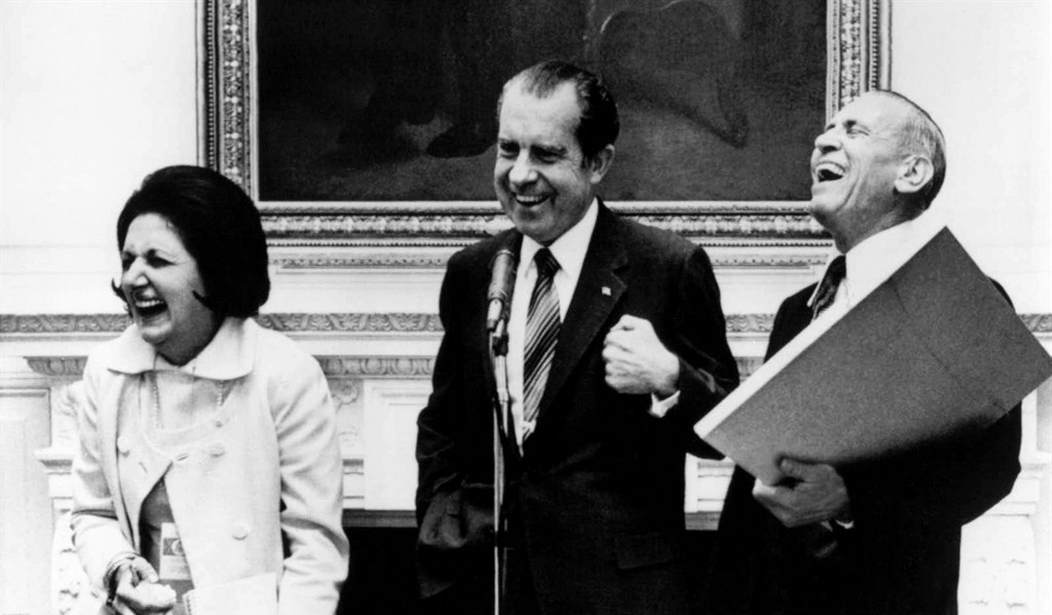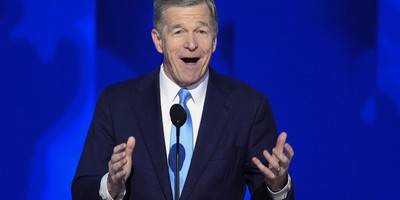Shortly before Richard Nixon was going to formally announce that he would be running again for president in 1968, Pat Buchanan and Rose Mary Woods, two of his closest aides, presented him with an idea.
"Given the multiple crises confronting the nation -- race conflict, soaring crime, inflation, the war in Vietnam, the mounting Soviet missile threat -- and the difficulty of dealing with them all at once," Buchanan writes in his new book "The Greatest Comeback," "we suggested that Nixon in a single declaration destroy the image of him as a consummate politician and tell the nation 'that the next president should be a one-term president.'"
Nixon dismissed the idea of term-limiting himself. He did not want, as Buchanan relates it, to be "a lame duck from his inaugural."
"In retrospect, Nixon was right," says Buchanan. "Yet when one looks at what he accomplished in his first term and what became of his second, he would today be listed, like Polk, who sought and served but a single term, among the near-great presidents."
Wherever Nixon's merits and demerits place him among American presidents, Buchanan's first-person chronicle of how Nixon climbed back from a humiliating defeat in the 1962 California gubernatorial election to win the presidency in 1968 is not just a unique and enduring look at one of this nation's most interesting political campaigns but at a decade that changed America forever.
Buchanan left his job on the editorial page of the St. Louis Globe-Democrat at the end of 1965 to become an assistant to Nixon, who was then planning to spend 1966 campaigning for Republicans running in that year's midterm elections.
The GOP was then still reeling from Barry Goldwater's 1964 defeat, and the question was whether the party, in 1968, would fall back into the hands of a liberal establishment headed by New York Gov. Nelson Rockefeller -- or turn to Gov. George Romney of Michigan.
Recommended
The GOP did neither, of course. In "The Greatest Comeback" -- which is a page-turning narrative, not an analysis -- Buchanan tells the story of Nixon's 1968 victory from the perspective of a man who travelled with, advised, and was loyal to Nixon, but is nonetheless candid about both Nixon's faults and his virtues.
"When Nixon trusted you he would let down his guard, and I got to know him better than any other boss I ever knew," Buchanan writes.
Buchanan anchored the right flank of Nixon's immediate staff, and part of his job was to help keep the conservative movement -- which had backed Goldwater in 1964 -- in Nixon's camp for 1968.
Beyond that was a longer-term political vision. "The crucial elements of the new majority I had in mind," writes Buchanan, "were the solid centrist GOP base that had stood by Nixon in 1960, the rising conservative movement, to which I belonged, the 'northern Catholic ethnics' of German, Irish, Italian, Polish and other East European descent, and the Southern Protestants, who saw themselves as abandoned by a Democratic Party moving leftward."
In this vein, Buchanan, who would later become President Ronald Reagan's communications director, sent Nixon a memo before the 1968 Republican convention urging that he pick the first-term California governor as his running mate.
"We are going to have to be bold to win this one," Buchanan wrote his boss. "I can currently think of nothing bolder than to put the hero of 'Bedtime for Bonzo' on the ticket."
Spiro Agnew got the nod instead.
Buchanan's book is a great story told by a great storyteller. Along the way are first-person anecdotes that not only reveal how Buchanan's boss plotted and executed what may indeed have been the greatest comeback in American political history, but also how he prepared himself to use the presidency he won to deal with great international problems, including the Vietnam War and U.S. relations with the Soviet Union and China.
Then it could hardly have been imagined that two decades later, under the leadership of Ronald Reagan, America would win the Cold War. Or that two decades after that, we would still be fighting a domestic cultural war that first began overtly manifesting itself in our towns and cities as Nixon inched his way toward victory in 1968.
Even though this book ends with Nixon's election, Buchanan makes clear he has only arrived at the middle of the story. Volume two will be set at the White House.

























Join the conversation as a VIP Member